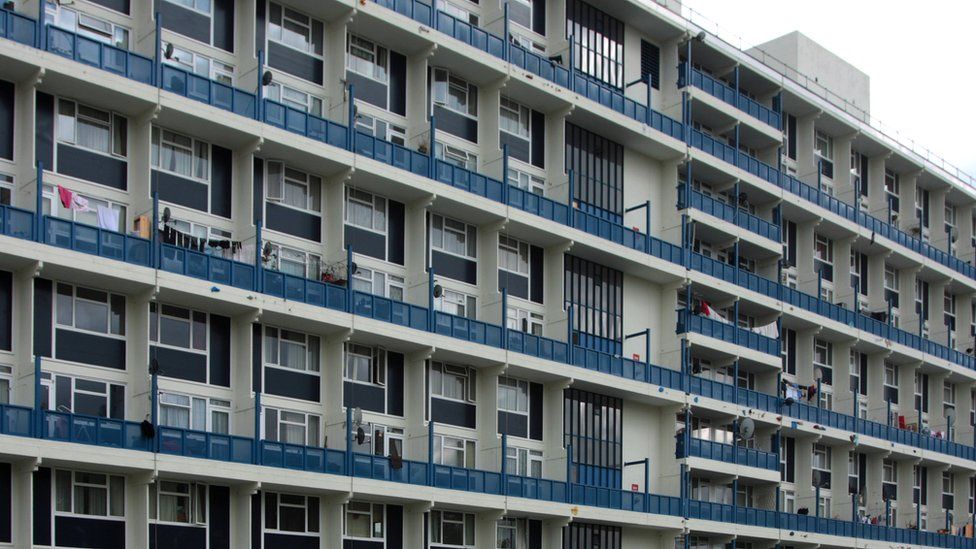ARTICLE AD BOX

By Christy Cooney & Charley Adams
BBC News
Tens of thousands of homes are "not in the state they should be", Housing Secretary Michael Gove has said.
His comments come after a coroner ruled the death of toddler Awaab Ishak was caused by exposure to mould at home.
The government has since stripped the association involved, Rochdale Boroughwide Housing (RBH), of £1m in expected funding.
Mr Gove said: "We are not giving money to organisations that are operating incompetently."
Asked on BBC Breakfast if RBH should be able to carry on, Mr Gove said the housing association had "failed" but there are signs the provider knows it needs to improve.
The housing secretary said he was visiting Rochdale on Thursday to "see the situation on the ground".
Two-year-old Awaab died in December 2020 after developing a respiratory condition brought on by the state of the social housing he was living in.
An inquest into the death heard that, beginning in 2017, his family repeatedly raised concerns about mould in the flat with RBH, but that no action was taken.
At one point, the family said, they were told to paint over an area where mould had developed.
The government has said housing providers that fail to address safety and quality concerns set by the Regulator of Social Housing will be blocked from new funding from the Affordable Homes Programme (AHP) until improvements have been made.
Providers that breach regulator standards will also be stripped of existing funding, except where construction has already begun.
Mr Gove said RBH and other housing associations already have the resources needed to deal with repairs, but "poorly run" organisations should not get more public money.
RBH needs to "shape up and concentrate on delivering for tenants" and once "they're doing their job properly they can expand", said Mr Gove.
He told BBC Breakfast: "I fear it's the case that there are tens of thousands of properties that are not in the state that they should be."
There are a "significant" number of homes - some built in the 1960s and 1970s "that simply need to be properly repaired and properly maintained", he said.
Mr Gove said there were many other housing associations and private landlords who are "not doing the right thing" and the issue needed to be tackled "nationwide".
Asked whether he was embarrassed by the situation, Mr Gove said it made him "angry" that people are living in bad conditions.
Image source, PA Media
Image caption,Two-year-old Awaab Ishak died after developing a respiratory condition brought on by mould in his family home
The government has said RBH will not get £1m in funding it had been set to receive from the fund, or receive any new AHP contracts, until it can "prove it is a responsible landlord".
It added that it would continue to monitor standards for RBH tenants "closely".
The AHP is a government scheme that provides grants to contribute towards the cost of building affordable housing.
Over the weekend, Mr Gove wrote to all social housing providers, as well as every council leader in England, to say they were being put "on notice".
He said that housing providers should carry out assessments of damp and mould in their properties and take "prompt action" to keep tenants safe when concerns were raised.
Announcing the latest measures, Mr Gove said RBH had "failed its tenants" and would "not receive a penny of additional taxpayers' money for new housing until it gets its act together and does right by tenants".
In a statement on Tuesday, the association acknowledged it had "got things badly wrong" and said the "whole organisation… is completely focussed on putting things right for our customers".
It added that it would "now significantly accelerate inspection of every single home we visit for damp and mould, and we will take immediate action where needed".
Responding to the announcements, Lisa Nandy MP, Labour's shadow housing and levelling up secretary, said it was "right to stand up to failing social landlords" but that there was "no excuse for not showing the same regard for millions of private rented tenants who live in squalid, unsafe conditions and are evicted if they dare to complain".
Labour has pledged that, if it wins the next election, it would bring in a renters' charter that would, among other things, create a national register of landlords and introduce new legally-binding standards for the private rental sector.

 1 year ago
28
1 year ago
28








 English (US)
English (US)